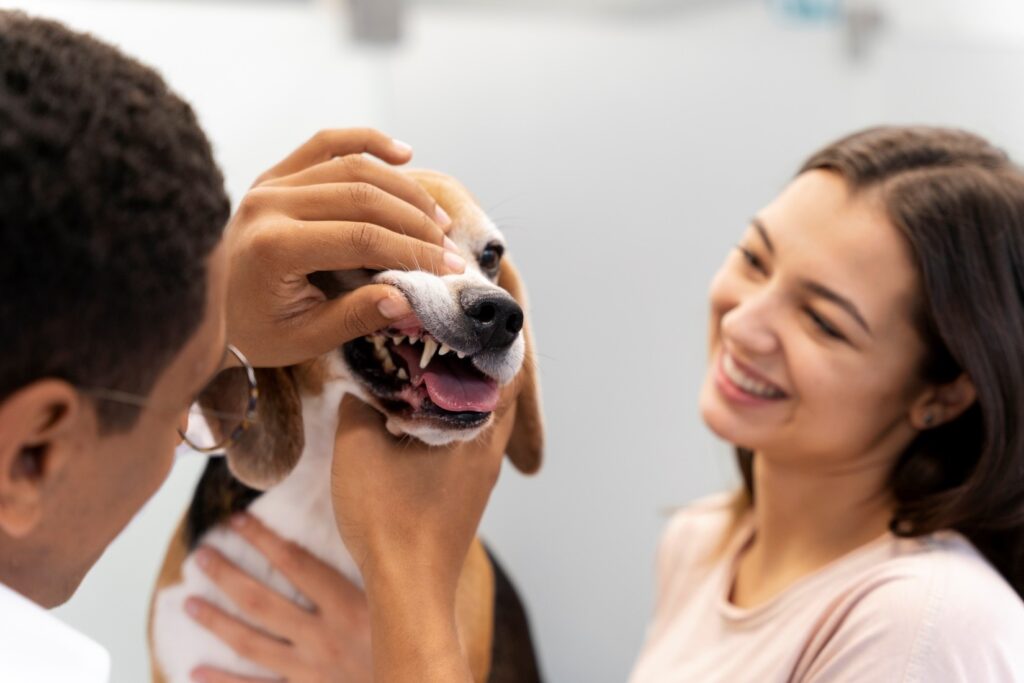
Keeping your pet’s teeth clean isn’t just about fresh breath—it’s essential for their health and happiness! Without regular dental care, pets can develop serious and painful issues. In this guide, we’ll walk you through the most common dental problems pets face and how to prevent them with easy, effective strategies.
Common Dental Problems in Pets
Dental issues can happen to any pet, regardless of breed or size. Here are some of the most common issues you may encounter:
- Bad Breath: Bad breath often signals early dental disease caused by bacteria buildup.
- Gum Disease: Gingivitis and periodontitis, both types of gum disease, can lead to infection and tooth loss.
- Tooth Resorption: Most common in cats, this painful condition causes the enamel to slowly disappear.
- Broken Teeth: Chewing on hard objects or accidents can cause painful tooth fractures.
- Dental Abscesses: Infections around tooth roots that are both painful and potentially dangerous if left untreated.
Dental Problems in Dogs and Cats
While both dogs and cats are susceptible to dental problems, they experience them differently.
Dental Issues in Dogs
Dogs often suffer from bad breath and gum disease. Although more common in cats, tooth resorption can also affect dogs, as can broken teeth and dental abscesses.
Dental Issues in Cats
Cats frequently experience issues like gingivitis, periodontitis, tooth resorption, and broken teeth. Dental problems in cats often lead to pain, difficulty eating, and even infections. Watch for symptoms like bad breath, excessive drooling, and trouble chewing—these may indicate a dental issue that needs a vet’s attention.
Why Regular Dental Checkups Are Essential
Routine dental checkups play a critical role in keeping your pet’s mouth healthy. During these visits, your vet will examine their mouth, teeth, and gums for any signs of disease. Vets may also perform professional cleanings to remove plaque and tartar buildup.
Tips to Prevent Pet Dental Problems
Here are some simple yet effective ways to prevent dental issues in your pet:
- Brush Your Pet’s Teeth Daily
Brushing is the best way to keep dental issues at bay. Use a pet-safe toothpaste and a soft-bristled toothbrush. Start slowly and gradually increase brushing time to make it comfortable for your pet. - Use Dental Chews and Toys
Dental chews and toys are excellent for scraping away plaque and tartar. Just ensure the products are designed for pets, and avoid anything too hard to prevent tooth damage. - Feed a Balanced Diet
A nutritious diet supports healthy teeth and gums. Avoid sugary or starchy foods, as these encourage plaque buildup. - Provide Fresh Water
Make sure your pet always has access to fresh water. Drinking water helps rinse away food particles and reduces bacteria growth. - Avoid Harmful Human Food
Sugary treats and bones can harm your pet’s teeth and overall health. Stick to pet-specific diets tailored to their breed and size. - See Your Vet Regularly
Schedule annual dental checkups and follow your vet’s advice on preventive care. Your vet can identify early signs of dental issues and offer treatments to keep your pet’s mouth healthy.

Signs of Dental Problems
Look out for signs of dental issues in your pet. Common symptoms include:
- Bad breath
- Excessive drooling
- Difficulty chewing
- Pawing at the mouth
- Swollen or red gums
- Tooth loss
If you spot any of these symptoms, contact your veterinarian immediately for an evaluation.
Professional Dental Cleanings
Even with regular home care, some pets need professional cleanings to maintain oral health. Vets perform these procedures under anesthesia to safely remove plaque, tartar, and diseased tissue. Regular cleanings can significantly improve your pet’s dental health and prevent serious issues.

Invest in Your Pet’s Health at Animal Hospital of Aurora
Don’t let dental issues keep your pet from living their best life. Schedule a checkup at the Animal Hospital of Aurora, where your furry friend will receive expert care to support their lifelong health. Reach out to us today for more information and to make an appointment!
Conclusion
Preventing pet dental problems takes a combination of regular home care and veterinary checkups. By following these tips, you can help your pet enjoy a lifetime of healthy teeth and gums. Remember, investing in dental care now is an investment in your pet’s overall happiness and well-being.



